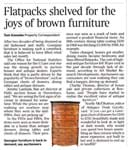One very important development that we believe hasn’t had enough publicity involves new ivory objects being sold as antique, thus by-passing laws and regulations.
All types of ivory are now sold in online auctions and listings described in different euphemistic ways: ‘cow bone’, ‘looks like bone’, ‘faux ivory, ‘composition’ and so on.
The total ban of ivory sales into the US has opened the gates to fraudulent sales and customs documents, and the exploitation of gullible buyers.
The people who have the necessary expertise and who spend time constantly looking at objects within their sphere of interest are experienced antique dealers.
Their interest is to have an honest trade which will protect live elephants and cultural heritage. The government should invite this expertise to be part of the solution.
Surely elephants deserve better than hysterical populist gestures. They deserve mature, informed and effective legislation. Lazy legislation, on the other hand, will make a bad situation worse.
Antigone Clarke and Joseph O’Kelly
Antique Boxes
MPs should told total prohibition would be a disaster
MADAM – It’s been suggested that very few MPs are aware of the reality or implications of the mooted total ban on ivory trading.
Every antiques, miniature, orientalist and silver dealer should write to their MP about this – see an extract from my letter to Nick Gibb, MP for Bognor Regis and Littlehampton, right. Dealers who know MPs personally should ear-bash them.
Ian Harris
N Bloom & Son
Ian Harris letter to Nick Gibb MP:
Elephants should not, of course, be slaughtered for their tusks, but on the other hand there are thousands of tons of ivory lying in warehouses around the world.
If this was released onto the open market, instead of virtue-signalling by burning it, the price would be lowered to a level where poaching was no longer profitable.
As a semi-retired antiques dealer, I can tell you that total prohibition would be a disaster.
Many antiques incorporate small pieces of ivory: tea and coffee pot insulators and finials, for example.
A large percentage of antique furniture has ivory detailing or escutcheons. Most miniatures are painted on ivory. Many other antiques incorporate small pieces of ivory.
Are these to be made completely unsaleable, or the items ruined by having tiny bits of ivory wrenched out?
And then there are huge and very valuable collections of Japanese netsukes and other ivory artefacts. Are these all to be rendered worthless?
The existing system, where ivory objects made pre-1947 are exempt, allows buying and selling of these items to continue. Auction houses are well aware of these rules and the hefty fines that accompany breaches.
The antiques trade brings in a huge amount of business to the UK and if there is a total restriction on ivory, this market will be largely destroyed.
A lot of trade will simply go underground, with a loss to the Exchequer.
I urge you to support the existing pre-1947 exemption
IVORY CONSULTATION – your opinion counts
To respond online go to: gov.uk/government/consultations/banning-uk-sales-of-ivory
You can request a paper questionnaire by writing to: International Team – Ivory Consultation, 1E Nobel House, 17 Smith Square, London SW1P 3JR
Or ask for one by emailing ivoryconsultation@defra.gsi.gov.uk
Deadline for response is December 29, 2017












